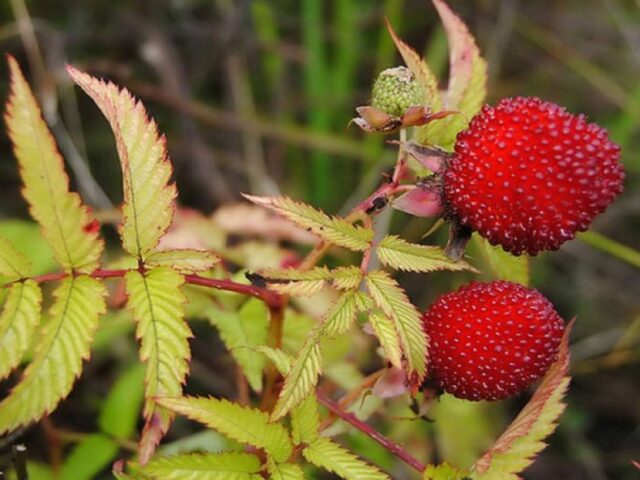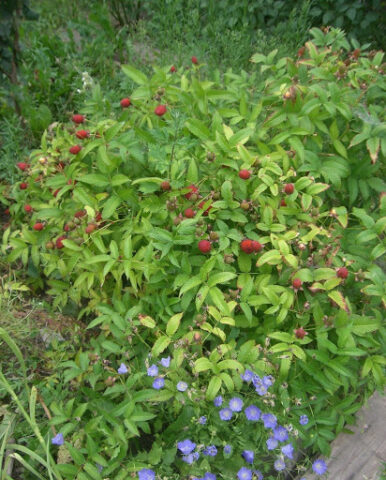Content
- 1 What is the name of a hybrid of raspberries crossed with strawberries
- 2 What does a raspberry-strawberry hybrid bush look like?
- 3 Benefits of a raspberry-strawberry hybrid
- 4 How to cross and breed a strawberry-raspberry hybrid yourself
- 5 Planting and caring for a raspberry-strawberry hybrid
- 6 Contraindications and possible harm
- 7 Conclusion
- 8 Reviews of gardeners with a photo about a hybrid of raspberries and strawberries
A raspberry-strawberry hybrid has not yet been developed. This name hides a separate type of berry from the Pink family. The fruits combine the features of both varieties. Moreover, they are grown in the same way as classic raspberries. The plant is highly winter-hardy. It can be diluted in most Russian regions.
What is the name of a hybrid of raspberries crossed with strawberries
The mixture of strawberries and raspberries is called Straweberry-Raspberry. The plant belongs to the Rosales family. It is not obtained as a result of crossing, but occurs in nature. The area covers the tropical regions of Africa. Australia and Asia. The raspberry-strawberry hybrid has many names:
- dwarf;
- strawberry;
- Himalayan;
- strawberry;
- Chinese;
- seductive;
- Tibetan;
- rose-leaved (rosaline).
There are also popular names: raspberry-strawberry, raspberry, ezhklubnik.
However, it is not entirely correct to call the culture a hybrid, since these berries were not crossed. There is only a plant that combines the traits of both berries. It is he who is conventionally called a hybrid.
What does a raspberry-strawberry hybrid bush look like?
The culture is a tall shrub. In nature, it reaches a height of 3 m, in a garden - only 120–150 cm. Its leaves are similar to the green of a rose. They are narrow, deep green, with a corrugated surface. Flowers are white, five-petaled, up to 5 cm in diameter.
The hybrid produces berries similar to raspberries and strawberries. They are not covered with leaves. During the fruiting period, the entire bush is covered, making it look very attractive. Berries weigh 3-5 g, resemble walnuts in size. 3-5 fruits appear on each branch.
The color is bright scarlet, the structure of the berries is grainy, like that of raspberries, although in shape they are more like strawberries. At the same time, the berries "look" up on the branches. The pulp is juicy, the taste is sweet, with a pleasant, slight sourness. The berry resembles more strawberries, and the aftertaste is raspberry. The fruits are consumed fresh and used for all kinds of preparations, like raspberries.
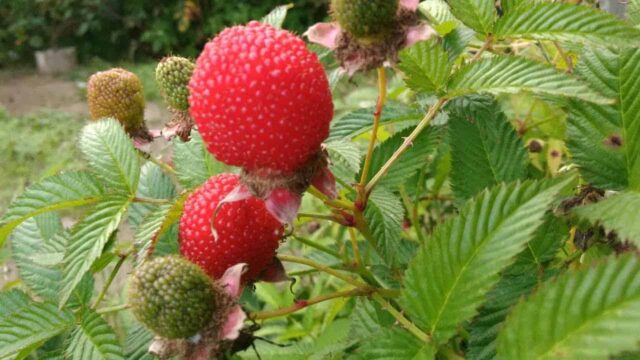
The berries of a hybrid of raspberries and strawberries are large enough
The keeping quality of the crop is also low. Therefore, the berries should be eaten immediately after harvesting, or jam and other preparations should be made.
Benefits of a raspberry-strawberry hybrid
The benefits and harms of a raspberry-strawberry hybrid are determined by the chemical composition of the berries. They contain quite a few valuable substances:
- organic acids (malic, salicylic, citric, tartaric);
- pectin;
- cellulose;
- tannins;
- flavonoids;
- vitamins C, PP, K, B (B1, B2 and B9);
- mineral components (potassium, manganese, calcium, iron);
- catechins;
- anthocyanin;
- ketones;
- simple sugars (pentose, fructose, glucose).
The use of berries of a hybrid of raspberries and strawberries has a beneficial effect on the body:
- improves digestion;
- strengthens the nervous system;
- softens the skin;
- increases testosterone levels in men;
Fresh fruits are recommended for the prevention of cancer.Berries help remove toxins from muscle tissue.
How to cross and breed a strawberry-raspberry hybrid yourself
You cannot cross raspberries and strawberries together on your own. These are too distant crops: raspberries are a shrub, and strawberries are a herbaceous plant. Therefore, there is no strawberry / raspberry hybrid. But there is a plant (Chinese raspberry), the fruits of which are similar in taste and shape to both berries.
Moreover, the shrub itself resembles a raspberry. And even in terms of growing conditions, soil requirements and preparation for winter, they are more raspberries than strawberries. That is why it can be grown in almost all Russian regions. The hybrid is undemanding to care for. It has other benefits as well:
- high decorativeness, especially during fruiting (there are a lot of berries, they are bright red and do not hide under the foliage);
- shrubs can be used to create hedges (up to 1 m). It decorates the garden not only in summer, but also in autumn, when the crimson leaves become especially attractive;
- the berries are edible and tasty, and the yield is consistently high;
- fruits are suitable for fresh consumption and for any traditional preparations (jam, jam, fruit drink);
- the culture is rare, so a hybrid of raspberries and strawberries can become a real business card.
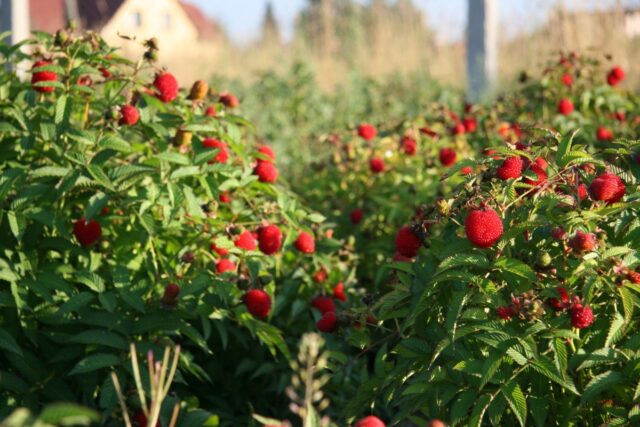
In summer, Chinese raspberry bushes are dotted with large berries
Planting and caring for a raspberry-strawberry hybrid
An unpretentious berry bush does not require special conditions. The rules for planting and caring for a hybrid are exactly the same as in the case of raspberries. It is enough to water it, periodically feed it, and do pruning. It is also worth taking care of preparing for the winter period, especially in the Urals, Siberia and the Far East.
Landing dates
Planting dates depend on the characteristics of the climate of the region:
- In the Moscow region and the middle lane, it can be planted both in spring and autumn.
- In the south, it is better to do this in September-October, since the weather during this period is humid and warm.
- In the Urals, Siberia, the Far East, it is better to postpone planting until the spring, since frosts can quickly come in the fall.
The specific timing of planting a hybrid of raspberries and strawberries depends on weather conditions. In the spring, it is better to plan for mid-April, and in the fall - for the first half of October.
Site and soil requirements
The hybrid is moisture-loving, although it does not tolerate excessive moisture. It feels good in sunny areas without moisture stagnation. Therefore, the requirements for the place are as follows:
- completely open (the sun should be abundant);
- dry (higher elevations than lowlands);
- protected from strong winds (near a fence, a house, powerful trees);
- the soil is fertile and light (loam);
- the reaction is weakly acidic (pH = 6.0–6.5).
Both raspberries and their hybrid with strawberries are megatrophs, i.e. to plants that are very demanding on the level of soil fertility. Therefore, a few months before planting, the earth is dug up and brought in a bucket of compost or humus per 1 m2.
If the soil is heavy, contains a lot of clay, 1 kg of sand or sawdust per 1 m should be embedded in it2... And if it has a pH of more than 7.0, you will need to water it with a 9% vinegar solution (100 ml per 10 l per 1 m2).
It is advisable to lay a layer of pebbles, broken bricks and other small stones 7–10 cm in height in the planting holes.
How to plant correctly
Holes need to be dug in advance (several weeks in advance). Moreover, the distance between them should be about 1 m, and it is better to leave 1.5 m between the rows. Thanks to this, you can freely walk in the raspberry-tree, take care of and harvest.
The landing algorithm is standard:
- Dig holes 50-60 cm in diameter and 40-50 cm wide.
- Place a drainage layer on the bottom.
- Spread the roots of the hybrid.
- Place the seedling in the center.
- Cover with a mixture of turf soil with humus (2: 1).
- Tamp a little so that the root collar goes to a shallow depth.
- Drizzle with settled water (5–10 liters per seedling).
- In the case of autumn planting, it is necessary to mulch for the winter by laying a high layer of dry leaf litter, sawdust, spruce branches or other materials.

Seedlings can be planted in a trench or separate pits
Follow-up care
To grow a productive hybrid of raspberries and strawberries, as in the description of the variety and in the photo, gardeners in their reviews recommend adhering to several rules:
- Regular watering (2-3 buckets per adult bush). It is necessary that the soil does not dry out, therefore, in the heat, water is given weekly, and the rest of the time - 2-3 times a month.
- Top dressing twice a season. In May, a mixture of 5 g of urea and a 10 liter mullein shovel. In September, 2-3 buckets of black peat or humus for each bush. You can also use complex mineral fertilizers, as well as special formulations for feeding raspberries.
- The soil needs to be loosened regularly and weeded. To make the job easier, even in the warm season, you can put straw, needles, sawdust or other mulch under each plant.
- Pruning is done every spring and every fall. In late March - early April, you need to remove all weak, frozen branches, shorten the old ones by 2/3 of the length in order to stimulate the growth of new shoots. In the fall, make a shaping haircut of a raspberry-strawberry hybrid. The dense crown needs to be thinned periodically - this will rejuvenate the plant and facilitate harvesting.
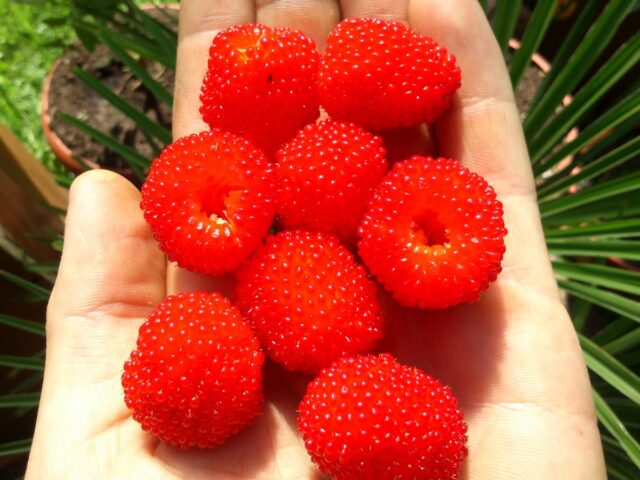
The plant bears fruit well even with minimal maintenance
Preparing for winter
Unlike strawberries, a hybrid with raspberries has a fairly high winter hardiness. Therefore, it does not need a special shelter for the winter, the creation of a frame. It is enough to lay a high layer of mulch in the trunk circle.
Although if the winter is unpredictable, thaws alternate with severe frosts, it is better not to risk it and pin the bushes to the ground. They are laid on spruce branches, and sprinkled on top with sawdust, dry leaves and covered with agrofibre or burlap. The material must be fixed with bricks or other heavy objects.
Contraindications and possible harm
If consumed in normal amounts, raspberry-strawberry hybrid berries will not do any harm. But in some cases, side effects may occur. Berries are contraindicated in the following cases:
- individual intolerance to certain substances (allergic reactions);
- gastritis, ulcer (especially in the acute phase);
- pancreatitis;
- gout;
- urolithiasis disease;
- diabetes mellitus (allowed in moderation);
- bronchial asthma;
- pregnancy (especially for women with uterine hypertonicity).
In the absence of contraindications, the fruits of a hybrid of strawberries and raspberries can be consumed in unlimited quantities. But in case of indigestion, kidney disease, it is better to limit yourself to small amounts. Pregnant women should check their diet with their doctor.
Conclusion
A hybrid of raspberries and strawberries has features of both berries. Although in fact this is not a hybrid, but a separate culture, in appearance and care, more reminiscent of raspberries. It is not difficult to grow such a shrub, since it is not demanding to care for. In addition, winter hardiness is high, and the yield is stable.
Reviews of gardeners with a photo about a hybrid of raspberries and strawberries
